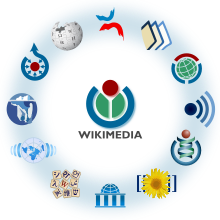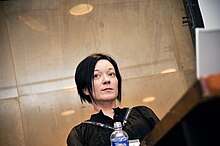Wikipedia:Wikipedia Signpost/2012-02-27/News and notes
Finance meeting fallout, Gardner recommendations forthcoming
Finance meeting fallout and Gardner recommendations to be finalized

According to the unofficial collaborative statement the Finance meeting 2012 in Paris on fundraising and Wikimedia Foundation–Chapters relations (Signpost coverage: Feb 13, Feb 20) delivered no substantial progress in regard to the ongoing debate on financial relations between the foundation and Wikimedia chapters. On the other hand the conference was seen as a step to improve the communication climate in the run up to the annual Wikimedia conference in Berlin at the end of March, and the Board of Trustees also clarified its interpretation of the Haifa letter (Signpost coverage).
However, the summit revived the Haifa debate about the chapters council proposal. Proponents of the basic concept argue that establishing some sort of international permanent body to represent chapter interests will both improve the cooperation among the participating organizations and strengthen the position of the chapter system as a whole in negotiations with the foundation. That represents a shift from the stance taken at Haifa, where the idea was mainly seen as a defensive move by some chapters in response to what was interpreted as aggressive action by the WMF. Neither the notes nor the unofficial statement made clear how this body would help to resolve the short term debates on finance or fit into the ongoing wider movement roles debate.
Instead, discussions about the council in Paris revolved around better coordination and the possibility of improving accountability standards among chapters through self-assessment and inter-organizational peer reviews. There are two models, called B and KISS, in early stages of discussion. Both reflect the largely continental European composition of the chapter communities and are nicknamed Bismarck (B) and Metternich respectively. While KISS focuses on a simple three stage structure with equal representation of all involved chapters, B includes significantly more paid employees to keep up with the capacity of WMF staff.
The board of the Austrian chapter took a lead by formally declaring its preference for KISS, and empowered its responsible board members to enter further negotiations. The outlined global debate timeline is hoped to lead to results in the run up to or at the Berlin conference between March 30 and April 1.
- Editor comments requested

According to a note on Meta, Sue Gardner is to present her final recommendations on fundraising and the dissemination of those funds to the Board of Trustees on March 9. She welcomes further discussion right up until that deadline, according to community liaison Maggie Dennis' note on the page; as long as the report is marked "draft", she is open to making changes.
It is unclear how aware individual editors on the English Wikipedia are that to provide input on WMF decisions such as the current proposals relating to fundraising and the distribution of funds, they must participate actively on the Meta website (although recent controversy surrounding a Meta-based request for comment on an English Wikipedia administrator will have heightened the site's profile locally). Judging from the amount of discussion of Sue Gardner's draft proposal, there is very little awareness among editors.
- Draft report highlights
Gardner stated in her draft report that she had hoped that her finalized recommendations on fundraising and funds dissemination would receive consensus support, but at this point she doubts this will happen, as the many past proposals and suggestions on how to move forward have historically not been supported and the problems remain unsolved. However, she warns that the status quo cannot continue:
| “ | And yet, the current situation is not sustainable: it’s damaging to individual and organizational relationships in the movement, it's not very efficient, and it isn't effectively safeguarding against various risks. | ” |
In the draft, Gardner criticizes the current Wikimedia structure that "enshrines" chapters based on geography. The chapters have no common mission. As they are considered "key" participants, the foundation has given the chapters two board seats on the Board of Trustees, whereas none of the Board members are selected specifically by ArbCom members, stewards, administrators or general members of the editing communities.
| “ | By extending special consideration to chapters and not to other groups or individuals, Wikimedia Foundation is privileging chapters at the expense of others: saying that chapters are more important, more central, more core. | ” |
The 160 countries of the world that do not have chapters do not benefit from special privileges dispensed by the foundation, nor does any editor not active in a chapter, regardless of their status in the community (including the en.wp community), such as ArbCom members, stewards or those in any other community-elected position.
| “ | The Wikimedia Foundation makes special efforts to recruit chapters representatives to our other lists such as ComCom and the treasurers list. The Wikimedia Foundation has been encouraging chapters to payment process in the annual campaign, and is encouraging them to spend hundreds of thousands of dollars annually – in some cases, millions of dollars. It has been encouraging them to create permanent staff and infrastructure supporting their work. It is signing agreements that effectively give chapters "exclusivity" in their geography, and committing to consulting with chapters before the Wikimedia Foundation takes any action – even meetings! – inside their country. | ” |
Gardner is convinced that the "enshrining" of the chapters as key is the wrong approach for the foundation, as it violates the basic principles of the movement:
| “ | Essentially: I believe that a model that privileges geography above all else is the wrong one for our movement: it doesn't really support who we are and what we do. I believe this is why the number of editors involved with their chapter is fairly small: because chapter work is specialized and particular: it isn't for everyone. I don't blame editors for not getting involved with their chapter, and I don't blame chapters for not achieving higher involvement by editors. To be clear: there's nothing wrong with chapters. What's wrong is that the Wikimedia Foundation’s actions have had the effect – to date – of enshrining the chapter model as the central organizing principle for the movement: the Wikimedia Foundation has been trying to make chapters into something they're not. | ” |
- Chapters council
Indeed, currently a Chapters council is being proposed to centralize the organization of all the chapters as well as control their organization and activities. The Chapters council, among other activities, will "determine consensus positions on common chapter interests and represent them in relations with the Foundation, the project communities, and interested external parties". This, in effect, appears to remove individual chapter autonomy so that the chapters will speak in one voice.
Brief notes
- WMF mid-year review: The Wikimedia Foundation staff Mid-Year presentation to the Board of Trustees from February 3 has been published. Besides presenting key figures for the organization, the review focused on main issues such as new editor retention, the global education program, progress on mobile, and the upcoming visual editor. The presentation is available here.
- Proposed Education report: A regular Wikipedia:Education report has been proposed (potentially to run in the Signpost), and a prototype perspective piece written by Thelmadatter. The report is envisaged as covering Wikimedia education programs from the perspective of the contributing volunteers, as opposed to foundation staff or regular members of the community. Comments and suggestions are solicited.
- New administrators: The Signpost welcomes our latest administrator, Dpmuk, whose successful RfA was remarkable in light of his comparatively low edit count (7,000).
- Milestones: The following Wikipedia projects reached milestones this week: the Mingrelian Wikipedia (2,000 articles), Kabyle Wikipedia (1,000 articles), Latvian Wikipedia (40,000 articles), and most notably the Greek Wikipedia, which celebrated its 70,000th article.



Discuss this story
Dear Signpost, thank you for mentioning the two models for a chapters council and stressing out the general movement atmosphere in which the discussion was revived. Please allow me to point out that the principle "one chapter, one representative" is valid for both models. By the way, I don't totally understand why the models reflect something "continental European", according to you. Kind regards Ziko (talk) 12:10, 28 February 2012 (UTC)[reply]
well, the numerous points made above on what "real" progress was archived are in terms of politics and are (of course) covered in the report ("step to improve the communication climate"). however, politics is not policy ("substantial progress..in regard to financial relations") and its only proper to maintain this distinction between ends and means in reporting, regards --Jan eissfeldt (talk) 12:34, 4 March 2012 (UTC)[reply]
Random question
Was curious, what is the average number of edits to an article? ResMar 23:58, 28 February 2012 (UTC)[reply]